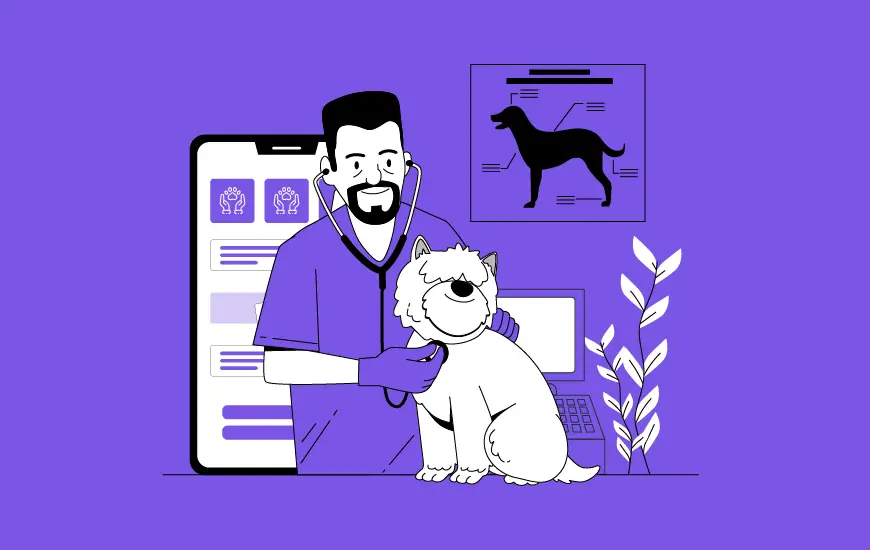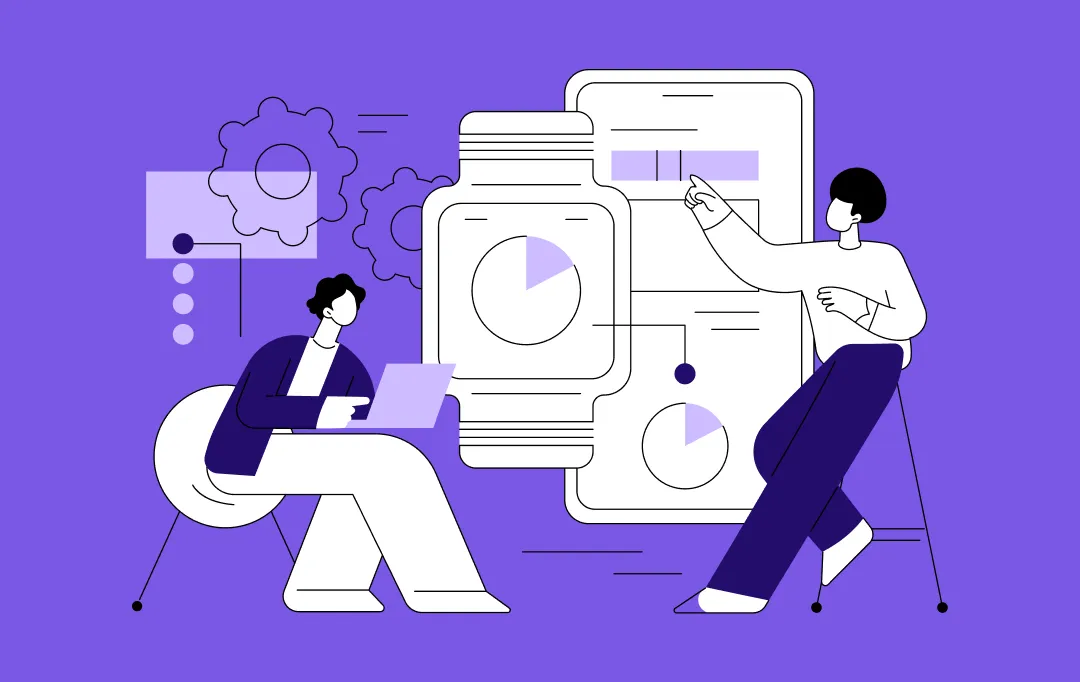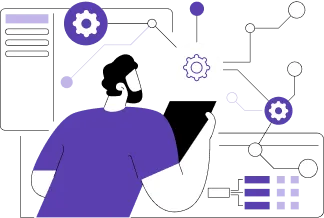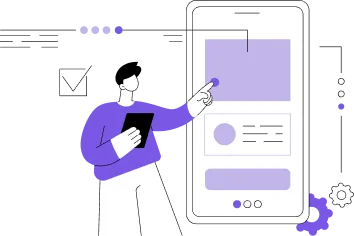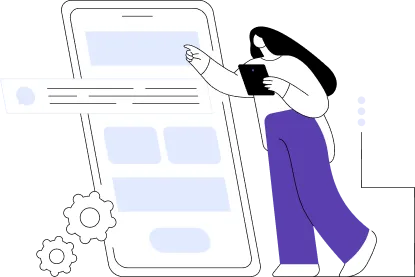- How Does the Digital Landscape in the Netherlands Influence Your App Development Choices?
- Why Are Dutch Users Driving Mobile First Demand?
- How Do Cloud and Modern Architectures Shape App Development in the Netherlands?
- How Is the Netherlands Adopting Emerging Tech Like AI and Automation?
- Why Does Understanding the Dutch Ecosystem Matter When Hiring Developers?
- 7 Key Criteria to Choose a Mobile App Development Service in the Netherlands
- 1. Does the Partner Have Industry Experience Relevant to Dutch Sectors?
- 2. Do They Have Technical Expertise in Modern Architectures?
- 3. Do They Understand Dutch and EU Regulatory Requirements?
- 4. Do They Follow a Transparent and Proven Delivery Process?
- 5. Can They Handle Multi-Region and Cloud Integration?
- 6. Do They Offer Post-Launch Support and Scaling Capabilities?
- 7. Are Their Pricing Models Transparent and Realistic?
- Common Mistakes Dutch Companies Should Avoid When Hiring an App Development Partner
- 1. Choosing a Partner Only Because They Are Low Cost
- 2. Ignoring EU Compliance Requirements
- 3. Not Validating Technical Depth
- 4. Skipping the Review of Past EU Projects
- What Are the Costs and Budget Considerations for Mobile App Development in the Netherlands?
- Estimated Cost Ranges for Dutch Businesses
- Key Factors That Influence App Development Costs
- How to Assess the Technical Expertise of a Mobile App Development Company
- Here is what to evaluate:
- Why the Netherlands Needs Future Ready App Development
- 1. Rise of AI and Automation Across Dutch Industries
- 2. Growth of Digital Public Services
- 3. Modernization Pressure on Legacy Systems
- 4. Cloud Expansion Across the EU
- How Does Appinventiv Support Dutch Businesses With Scalable App Development?
- FAQs
Key takeaways:
- Choose partners with proven Dutch and EU experience rather than focusing on the lowest price.
- Strong compliance with GDPR, NIS2, PSD2 and MDR is essential for building apps that meet Dutch regulatory expectations.
- Cloud native architecture on AWS EU, Azure Netherlands or Google Cloud EU ensures better scalability and performance.
- Evaluating the actual team behind the project gives a clearer picture of quality than portfolio alone.
- Future ready app architecture saves long term cost and supports seamless growth across the EU.
If you run a business in the Netherlands, you already know how quickly the digital landscape is shifting. Dutch consumers expect smooth mobile experiences, and companies across logistics, fintech, healthcare, and public services are investing heavily in mobile-first solutions. According to the European Commission’s DESI framework, the Netherlands consistently ranks among the top three most digitally advanced economies in the EU, with some of the highest mobile adoption and cloud usage rates in Europe. This growth means one thing. The apps Dutch businesses build today need to perform well, scale fast, and stay compliant across strict EU regulations.
That is where choosing the right development partner becomes so important. Many teams start the process searching for the best mobile app development companies in the Netherlands, but what they really need is clarity on how to choose mobile app developers in the Netherlands based on technical depth, regulatory understanding, and real experience with Dutch industries. The wrong partner increases delays, cost overruns, and compliance risks. The right one helps your business move faster in an increasingly mobile-led Dutch economy.
This blog is your mobile app development guide for the Netherlands, designed for Dutch founders, SMEs, and enterprise leaders who want practical criteria for selecting a mobile app development partner Netherlands without second-guessing each step. Written with a Dutch market lens, it covers the factors that influence long term success, including compliance, cloud integration, technical capability, and understanding of local user behavior.
When you know what matters, you avoid guesswork and make confident decisions that support growth in the Netherlands and the wider EU. With Dutch business digital transformation accelerating and Dutch market mobile app adoption rising every year, companies need development partners who understand both user expectations and EU regulatory realities.
Ready to build for a fast-growing market?
How Does the Digital Landscape in the Netherlands Influence Your App Development Choices?
The Netherlands is one of Europe’s most advanced digital economies, so selecting a mobile app partner requires understanding how Dutch users and businesses operate. Expectations here are higher, regulations are stricter, and mobile adoption is stronger than in many other EU markets.
Below is a clearer breakdown of what shapes the app development ecosystem in the Netherlands and why these elements matter when you start evaluating app development agencies in the Netherlands.
Why Are Dutch Users Driving Mobile First Demand?
Dutch consumers are among Europe’s most active digital users. Deloitte Netherlands reports steady growth in digital behaviour across banking, retail, healthcare, public services, and entertainment.
This means your app must deliver:
- Fast performance
- Clean interfaces
- Smooth navigation
- Accessibility
- High reliability
Dutch users have low tolerance for friction, so poor execution can affect retention immediately.
How Do Cloud and Modern Architectures Shape App Development in the Netherlands?
Businesses across the Netherlands continue shifting to EU centric cloud setups. Because of this, your app development partner must understand:
- Cloud native architectures
- Secure EU data handling
- Implementing microservice architecture
- Real time data integration
- API driven ecosystems
Dutch companies expect long term scalability, not short lived solutions.
How Is the Netherlands Adopting Emerging Tech Like AI and Automation?
McKinsey and Deloitte Netherlands highlight increasing adoption of AI powered services across Dutch enterprises. This pushes app development beyond basic features. Dutch companies now look for partners who can support:
- AI driven personalization
- Intelligent automation
- Predictive analytics
- Data engineering
- Integration with cloud AI services
Apps built today must support tomorrow’s capabilities.
Why Does Understanding the Dutch Ecosystem Matter When Hiring Developers?
The app development ecosystem Netherlands is supported by strong cloud infrastructure and a growing pool of tech talent in the Netherlands, making the region one of the most competitive digital hubs in Europe. Dutch businesses aren’t just looking for functional apps. They want:
- EU compliant architecture
- Scalable cloud infrastructure
- Strong security posture
- UX aligned with Dutch user behaviour
- Long term maintainability
This context forms the base for the next section, where we start breaking down the key factors to consider when choosing app developers Netherlands.
7 Key Criteria to Choose a Mobile App Development Service in the Netherlands
According to Mordor Intelligence the Netherlands’ digital transformation market is projected to reach $66.07 billion in 2030, growing at a CAGR of over 13%. That level of investment underlines how critical it is for Dutch companies to select a development partner who can keep pace with both local and EU-wide demands.
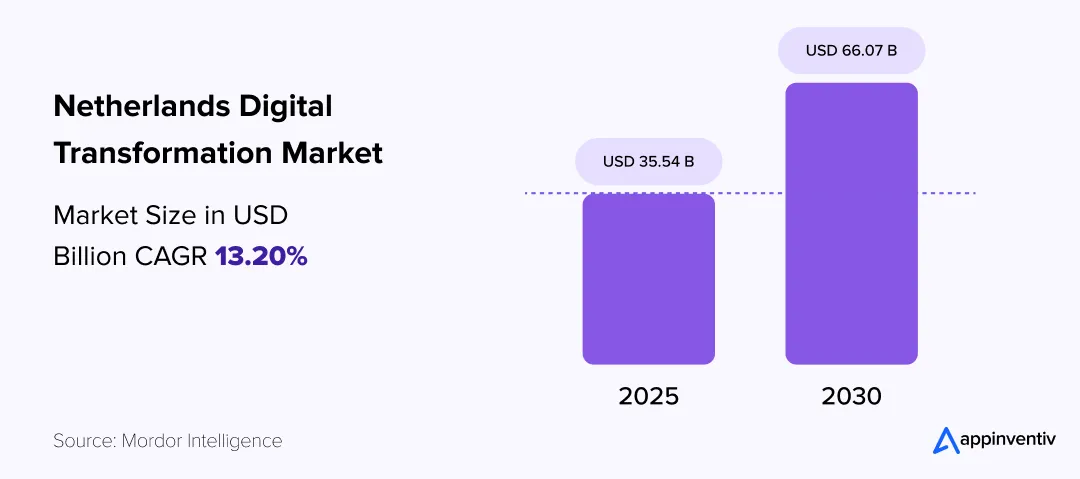
1. Does the Partner Have Industry Experience Relevant to Dutch Sectors?
Sector-specific know-how matters. Dutch logistics, fintech, energy and healthcare all operate under unique rules and customer expectations.
What to check:
- Case studies from these sectors (port operations, digital payments, urban mobility)
- Portfolio clients in the Netherlands or neighbouring EU markets
- Demonstrated outcomes (efficiency, user retention, regulatory compliance)
Understanding these factors is essential for anyone exploring how to hire app developers in the Netherlands with the right industry expertise. A partner familiar with Dutch practices avoids “one-size-fits-all” solutions and delivers faster value.
2. Do They Have Technical Expertise in Modern Architectures?
The Dutch market expects apps built for scale, performance and future growth.
Look for:
- Cloud-native development
- Secure API integration (EU systems)
- Microservices architecture and event-driven systems
- AI / ML / automation / data engineering capabilities
Having these shows the partner is ready for Dutch and EU digital ecosystems, not just the minimum viable product.
3. Do They Understand Dutch and EU Regulatory Requirements?
Compliance isn’t optional in the Netherlands. A partner must be fluent with both Dutch and broader EU rules.
Essential standards:
- GDPR
- NIS2 (for critical infrastructure)
- PSD2 (fintech)
- MDR (healthcare apps)
- ISO/IEC frameworks (security)
Choose a partner who embeds compliance from the start – it reduces risk and increases trust.
4. Do They Follow a Transparent and Proven Delivery Process?
Dutch businesses value clarity, predictable progress and disciplined collaboration.
Signs of a strong process:
- Clear sprint plans and regular status updates
- Early prototyping and user journey definition
- UX audits tailored to Dutch users
- Accessibility and sustainability built in
Such a process lowers surprises, aligns expectations and speeds up time-to-market.
5. Can They Handle Multi-Region and Cloud Integration?
Netherlands-based apps often span EU regions, so multi-region cloud and data-flow capabilities matter.
Must-have features:
- Experience with AWS EU, Azure NL, Google Cloud EU
- Data routing and storage aligned with GDPR and Dutch data-sovereignty norms
- Support for multilingual (Dutch + English) user experience
- Architecture ready for expansion into Belgium, Germany or Nordics
This future-proofs your app for growth beyond the Dutch market.
6. Do They Offer Post-Launch Support and Scaling Capabilities?
An app launch is just the beginning. Users evolve fast. Your partner must evolve with them.
What to verify:
- Maintenance, performance monitoring, and updates built in
- Feature roadmap based on Dutch consumer behaviour and feedback
- Long-term support model (not just hand-off once live)
Selecting a partner who plans for the lifecycle ensures the app remains competitive and relevant.
7. Are Their Pricing Models Transparent and Realistic?
How a partner prices their work often indicates how much they understand the market and your needs.
Evaluate:
- Clear cost breakdowns (development, infrastructure, support)
- Realistic timelines and milestone definitions
- Total cost of ownership discussion (updates, maintenance, scaling)
- No vague scopes or “we’ll figure it out later” statements
This level of clarity also streamlines Netherlands app development vendor selection, especially for companies evaluating multiple proposals at once. A partner who provides this from the start is easier to work with and delivers less risk.
Common Mistakes Dutch Companies Should Avoid When Hiring an App Development Partner
Many Dutch businesses enter mobile development with good intentions but still run into predictable pitfalls. These mistakes can slow down delivery, increase long term costs, or put the product at risk of non compliance. Here are the key errors to avoid and what to do instead.
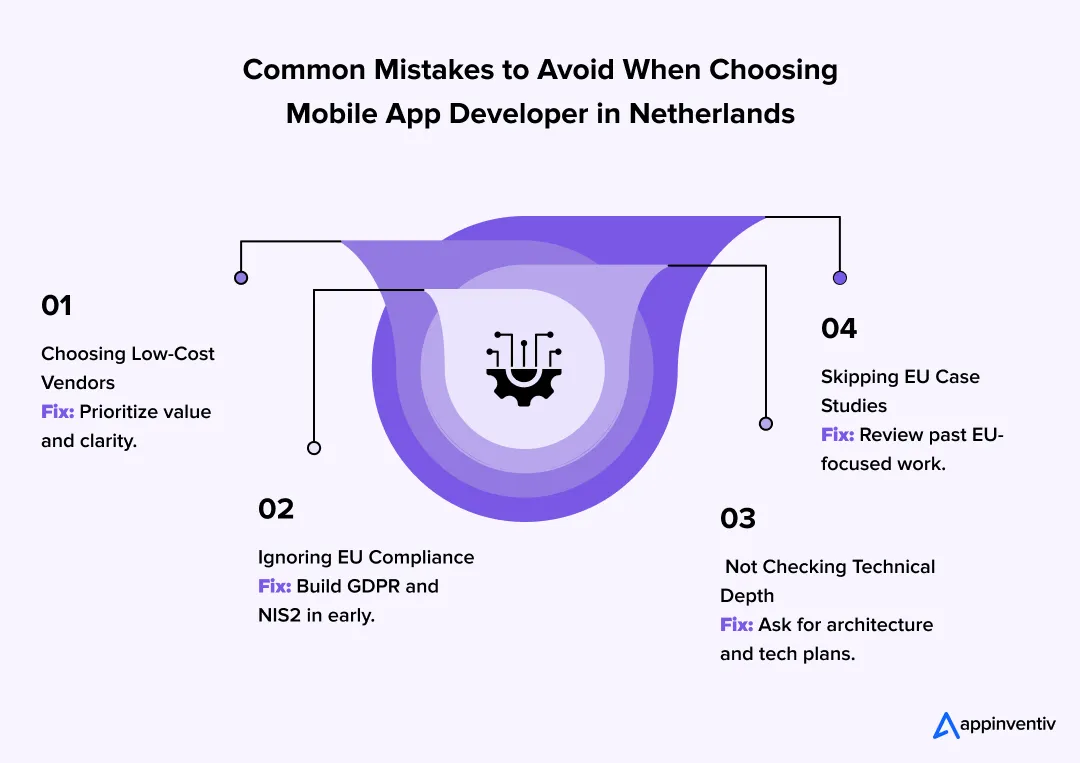
1. Choosing a Partner Only Because They Are Low Cost
Low pricing often means limited senior talent, rushed delivery, or poor long term support. This usually results in higher expenses later when the app needs to be rebuilt or fixed.
Solution: Compare value, not just cost. Look for partners who provide a detailed scope, realistic timelines, and clarity around total cost of ownership. Dutch companies benefit most from structured pricing, not the cheapest quote.
2. Ignoring EU Compliance Requirements
Some businesses assume compliance can be added later. In the Netherlands, this approach creates significant risk. GDPR, NIS2, PSD2, and MDR requirements affect how the app is designed from the beginning.
Solution: Ask the partner to explain how they build compliance into architecture, data flows, security, and documentation. Request examples of past EU compliant projects to confirm they understand Dutch regulatory expectations.
3. Not Validating Technical Depth
A partner may speak confidently about technology but still lack experience with cloud native systems, scalable architectures, secure APIs, or AI driven features. Without technical depth, the app may fail to meet Dutch performance and scaling needs.
Solution: Request a technical rundown of how they would architect your app. Ask for details on cloud setup, security, data engineering, and integration strategy. A strong partner will explain these in clear, practical terms.
4. Skipping the Review of Past EU Projects
Many Dutch companies focus on portfolios but forget to check whether the partner has worked on EU based projects with similar compliance, infrastructure, or user behavior patterns.
Solution: Review case studies from Netherlands or comparable EU markets. Ask how they handled privacy, scaling, accessibility, and performance for European users. Choose partners who have already delivered in this environment.
What Are the Costs and Budget Considerations for Mobile App Development in the Netherlands?
When Dutch companies start exploring mobile app development, one of the first questions that comes up is cost. Most projects in the Netherlands fall somewhere between €34,634 to €346,340 ($40,000 to $400,000), but the final number depends heavily on what the app needs to do, how secure it must be and how much long-term support the business expects. Because the Netherlands has a digitally mature market, budgets must account for more than development alone. Cloud hosting, EU-level security, compliance and ongoing evolution all play a role.
Estimated Cost Ranges for Dutch Businesses
| App Type | Description | Estimated Cost (USD) |
|---|---|---|
| Basic App | Simple features, straightforward UI, minimal integrations | €34,634 – €69,308 ($40K – $80K |
| Mid-Complexity App | API integrations, dashboards, multilingual support, EU-based hosting | €69,308 – €173,170 ($80K – $200K) |
| Enterprise / Complex App | AI automation, microservices, multi-region deployment, strict EU compliance | €173,170 – €346,340+ ($200K – $400K+) |
These ranges are broad because no two Dutch businesses build the same thing, and each sector brings its own complexity. Fintech and healthcare apps cost more because of compliance. Logistics apps often require real-time data. Retail needs a polished user experience and integrations. All of this affects the final budget.
Key Factors That Influence App Development Costs
- Scope and Technical Complexity: More features mean more engineering time. Apps with AI, automation, real-time data or multi-region deployment fall on the higher end of the budget. This is why knowing how to evaluate the team behind the app development service matters early on.
- Security and EU Compliance: Dutch companies must meet GDPR, NIS2, PSD2 or MDR depending on the sector. Understanding what security and compliance issues Dutch companies should prioritize helps avoid expensive rework later.
- Cloud Architecture Requirements: Using AWS EU, Azure Netherlands or Google Cloud EU adds planning cost but reduces long-term infrastructure spend. Cloud-native builds also support smoother growth across the EU.
- Post-Launch and Long-Term Support: Maintenance, updates and performance monitoring typically add 15 to 25 percent of the initial cost annually. This shows how important post-launch support and long-term partnership are for Dutch businesses.
- Future-Ready Architecture for EU Expansion: Apps built for Belgium, Germany or the Nordics need multi-region design from the start. Early planning ensures you are building a future-ready app with the right Netherlands development partner instead of facing costly reconstruction later.
Also Read: Custom Software Development Cost in the Netherlands
How to Assess the Technical Expertise of a Mobile App Development Company
Understanding technical depth is one of the strongest predictors of project success. This is where most Dutch businesses realise why choosing the right app development partner matters. A capable team ensures the app is secure, scalable and compliant with Dutch and EU standards from day one.
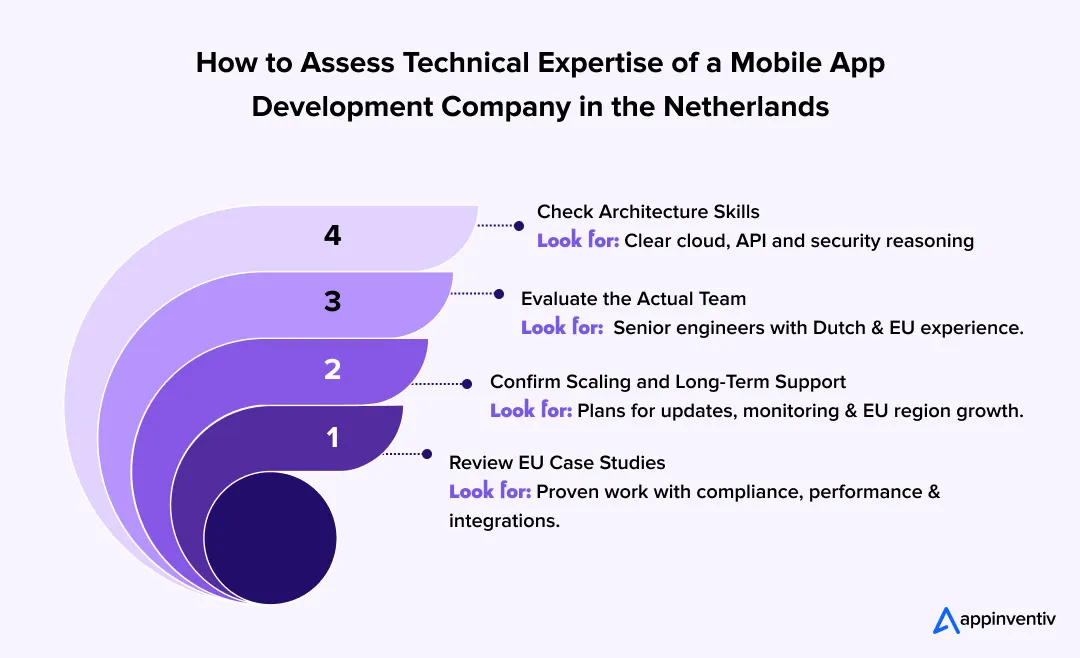
Here is what to evaluate:
- Review the Engineering Approach and Architecture Decisions
Ask the team to walk you through how they would design your app. Their explanation should cover cloud native architecture, data flow, API strategy and security layers. Strong mobile app development services in the Netherlands will explain these choices clearly instead of relying on vague technical jargon.
- Evaluate the Team Behind the App Development Service
Look at the core team working on your project: solution architects, senior developers, UX specialists and QA engineers. The goal is to understand whether the people building your product have experience with Dutch sectors and real EU compliant deployments. This helps you choose mobile app developers in the Netherlands who can deliver predictable long term value.
- Check Their Ability to Support Scaling and Long Term Roadmaps
Technical expertise is not only about development. It also includes how important post launch support and long term partnership really are. A strong partner will already have a plan for updates, performance monitoring, EU region scaling and new feature rollouts.
- Look for Evidence in Case Studies and Previous EU Projects
Real technical expertise is visible in past work. Review their portfolio to see how they solved performance issues, handled compliance or integrated third party systems for Dutch or EU clients.
Why the Netherlands Needs Future Ready App Development
The Netherlands is moving deeper into digital transformation, and mobile apps now sit at the center of how people work, transact and access services. This shift is not slowing down. Dutch businesses need apps that are built for what the market will look like tomorrow, not just what it needs today.
1. Rise of AI and Automation Across Dutch Industries
AI innovation in the Netherlands is accelerating across logistics, finance, energy and healthcare. Businesses are using machine learning for route optimization, fraud detection, digital onboarding and predictive maintenance.
What this means for app development:
- Apps must integrate AI driven features
- Data pipelines and APIs must support real time insights
- Architecture should allow easy addition of new AI capabilities
Partners who lack AI maturity limit your ability to innovate in the Dutch market.
2. Growth of Digital Public Services
Dutch citizens increasingly rely on mobile channels to access government services, healthcare information, education and public utilities. This trend pushes businesses to match the same level of speed, transparency and usability.
Implication for businesses:
- Mobile apps must meet public sector level performance
- UX should support clear navigation and accessibility
- Systems must be secure, compliant and reliable at scale
Your app becomes part of a larger digital ecosystem, not a standalone product.
3. Modernization Pressure on Legacy Systems
Many Dutch enterprises still operate on older platforms that cannot support new digital demands. These systems slow down innovation and increase operational risk.
Future ready apps help by:
- Offering microservices based replacements for legacy modules
- Enabling smoother integration with ERP, CRM and operational systems
- Improving long term maintainability and reducing technical debt
Modern apps help Dutch companies stay competitive in sectors where speed and data driven decisions matter.
4. Cloud Expansion Across the EU
The Netherlands has one of the highest cloud adoption rates in Europe, and EU wide cloud expansion is accelerating. Businesses now need architectures that can operate securely across multiple EU regions while keeping data compliant with GDPR.
For app development, this means:
- Cloud native architectures are now a baseline expectation
- Multi region deployments must be planned from day one
- Security and data routing must follow EU sovereignty standards
Future ready apps let Dutch businesses scale into Germany, Belgium, the Nordics and beyond without rebuilding core infrastructure.
How Does Appinventiv Support Dutch Businesses With Scalable App Development?
Choosing mobile app developers in the Netherlands is not just about finding a team that can write code. It is about selecting a partner who understands Dutch users, EU regulations, modern cloud environments and the long term product vision your business needs. That is where Appinventiv supports Dutch companies with a practical approach to mobile app development services in the Netherlands.
Our work spans global brands and complex enterprise ecosystems. For example, we helped Adidas build a high performance ecommerce mobile experience that continues to support millions of users worldwide.
This project reflects the kind of engineering, scalability and compliance focus that Dutch businesses require. Whether you operate in logistics, fintech, retail or public services, we help you design architectures that fit EU standards, integrate with cloud native environments, and support growth across the Netherlands and the wider European market.
If your organisation is evaluating mobile app development services in the Netherlands and wants a partner who combines strong technical depth with Dutch market understanding, our team can help you move from idea to a secure, scalable and future ready product.
Let us help you build the next app your users will rely on.
FAQs
Q. How do I choose a mobile app development company in the Netherlands?
A. Start by checking the company’s experience with Dutch industries, their knowledge of EU regulations and their ability to deliver scalable cloud architectures. Review case studies, ask about their engineering process and confirm whether they can support long-term updates after launch.
Q. What should Dutch businesses look for in a mobile app development partner?
A. Dutch companies should prioritize technical depth, compliance capability, cloud expertise and a proven delivery model. It is also important to assess how well the partner understands Dutch user behavior and sector-specific workflows.
Q. How do I evaluate app developers in the Netherlands?
A. Look for clarity in architecture decisions, transparent sprint planning and an ability to integrate with EU-based cloud systems. Reviewing past work, speaking with previous clients and understanding how the team handles security and maintenance will give you a clear picture of quality.
Q. What criteria matter when selecting an app development agency?
A. Key criteria include industry experience, modern engineering skills, GDPR and NIS2 compliance, UI/UX capabilities and strong communication practices. Agencies with clear documentation and predictable delivery timelines tend to be more reliable.
Q. How can Dutch companies identify reliable app development services?
A. Reliability shows in process discipline. Check whether the agency offers structured discovery workshops, clear technical documentation, defined handover processes and ongoing support. These indicators help Dutch companies separate reliable teams from inexperienced ones.
Q. Do Netherlands-based companies offer better compliance and data security?
A. Often, yes. Local companies are typically more familiar with GDPR, PSD2, MDR and NIS2, which reduces risk for Dutch enterprises. They also understand European cloud hosting norms and data-sovereignty expectations.
Q. What certifications should app developers in the Netherlands have?
A. Common certifications include ISO 27001 for information security, SOC 2 for data handling, and compliance experience with GDPR and NIS2. For fintech and healthcare projects, look for PSD2 and MDR familiarity. These credentials help validate capability and trustworthiness.
Q. What should I consider for technology outsourcing Netherlands projects?
A. When exploring technology outsourcing Netherlands initiatives, make sure your partner understands the Dutch regulatory environment, works with EU-based cloud regions and can support both Dutch and English user experiences. Strong communication and a clear support roadmap are also essential.


- In just 2 mins you will get a response
- Your idea is 100% protected by our Non Disclosure Agreement.
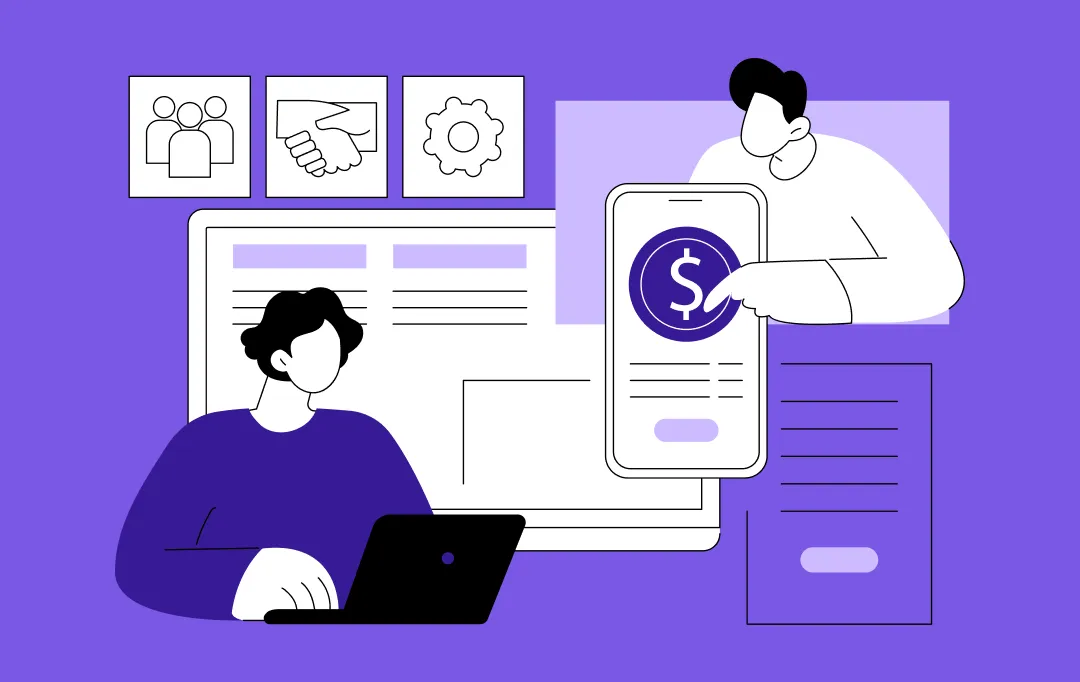
Step-by-Step Guide to Digital Tipping Platform Development for Australia: Features, Costs & ROI
Key takeaways: Digital tipping is now a system-level decision Once tips move through digital payments, they intersect with payroll, reporting, and workforce trust. Informal handling does not scale. Sector-specific design determines success Cafés, restaurants, hotels, delivery services, and franchises each require different allocation logic and operational controls to reflect how work is delivered. Cost reflects…
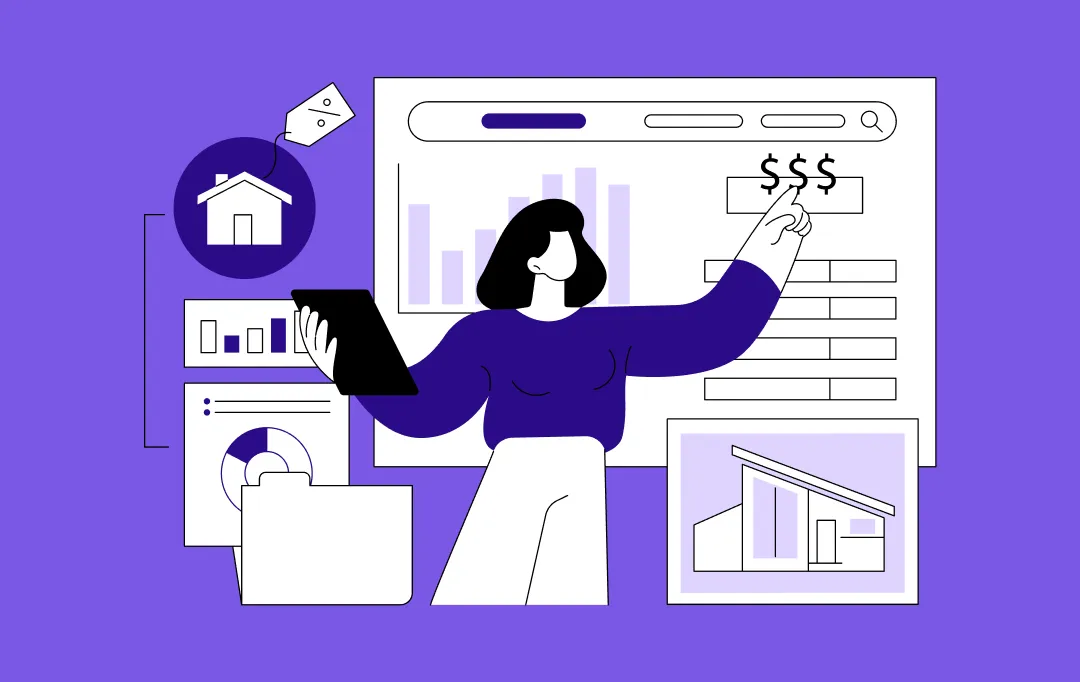
Building a Future Ready Real Estate Platform in Qatar for Vision 2030
Key Takeaways Future-ready real estate platforms in Qatar are treated like infrastructure, not apps. They’re built to last, with strong data, clear governance, and room to adapt as policies and projects evolve. Off-the-shelf tools work only until complexity shows up. Once approvals, compliance, and multiple stakeholders are involved, custom platforms usually hold up far better.…

Investing in the Future: Why Arabian Education App Development is Surging
Key Takeaways: Education apps in the Arabian region are no longer stopgap solutions. They’re becoming part of how learning actually runs day to day. Schools, universities, and governments are choosing platforms that scale quietly and fit real teaching routines. The apps that succeed focus on stability, integration, and usability rather than packed feature lists. Most…





















